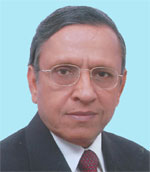 Only a healthy body can encompass a healthy mind. Health facilitates better productivity, longevity and the vigour to serve. The WHO theme this year for the World Health day is “Vector Borne Diseases”. The Red Cross Movement, in turn, has decided to lay special focus on Dengue, which was almost non-existent until the 1950s, but has now been reported from almost all countries around the world and is taking the shape of a hidden disaster. Dengue is transmitted by the bite of a mosquito infected with one of the four dengue virus serotypes. It is a febrile illness that affects infants, young children and adults with symptoms appearing 3-14 days after the infective bite. Only a healthy body can encompass a healthy mind. Health facilitates better productivity, longevity and the vigour to serve. The WHO theme this year for the World Health day is “Vector Borne Diseases”. The Red Cross Movement, in turn, has decided to lay special focus on Dengue, which was almost non-existent until the 1950s, but has now been reported from almost all countries around the world and is taking the shape of a hidden disaster. Dengue is transmitted by the bite of a mosquito infected with one of the four dengue virus serotypes. It is a febrile illness that affects infants, young children and adults with symptoms appearing 3-14 days after the infective bite.
Vector-borne diseases account for 17% of the estimated global burden of all infectious diseases. While diseases such as malaria have been with us for centuries, dengue has become the world’s fastest spreading vector-borne disease, with a 30-fold increase in disease incidence over the past 50 years.
According to the World Health Organization, one million people die every year because of vector-borne diseases with more than half of the planet’s population at risk. The nature of both known vector-borne diseases and new viruses can be unpredictable and highly infectious. Vector-borne illnesses are spread by blood-sucking arthropods, such as mosquitoes, sand flies and ticks. These small "vectors" carry infectious microbes which can be transmitted by a single bite. Vector-borne diseases can be transmitted to animals as well as to people. These diseases are commonly found in tropical and sub-tropical regions and places where access to safe drinking-water and sanitation systems is problematic.
Apart from these, vectors spread many more deadly diseases like Chikungunya, Chagas disease, Dracunculiasis, Leishmaniasis, Lymphatic Filariasis, Lyme disease, Onchocerciasis, Schistosomiasis and Yellow Fever.
People suffer from a significant disease burden from these diseases in local and focal areas of India. The epidemiology of these vector borne diseases varies considerably as it is most often dependent on ecology, vector bionomics, economic, socio-cultural and behavioral factors. Generally, these Vector borne diseases spread in rural and tribal areas and urban slums inhabited by the poor, marginalized and vulnerable groups with limited access to quality health care, communication and other basic amenities.
The Indian Red Cross Society through its volunteers, has on a number of occasions initiated effective measures, education and dissemination drives for control of the vector mosquitoes. Our volunteers have garnered community support and increased awareness which is very important to control the transmission of these diseases. The society runs various blood banks throughout the country which have done commendable work in supplying platelets and other services during the Dengue outbreak season. The Blood Bank at the National Headquarters in New Delhii, has been declared a model Blood Bank and the staff works tirelessly to serve the increased demand, during the Dengue outbreak months. In the year 2013, during the Dengue outbreak months of September-November, the National Headquarter Blood Bank alone issued approximately 9000 platelet units.
There are obstacles to the goal of a disease free country, as we live in the second most populous country in the world, which has multiple problems of overcrowding, hunger and lack of basic facilities including access to health facilities. Nonetheless our willingness and sincere efforts will go a long way in the accomplishment of our goals. Just as we have achieved the goal of being Polio-Free, we will soon see other Millenium Development Goals realized. I call upon the youth of our country, our future leaders to be a part of the Indian Red Cross movement as volunteers and junior and youth Red Crossers to help usher a new revolution in order to see our country and the world healthy and disease free.
Dr S P Agarwal
Secretary General,
Indian Red Cross Society
|